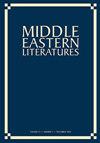Dream interpretation and parodies of translation in Aḥmad Fāris al-Shidyāq’s al-Sāq ʿalā al-sāq
IF 0.2
4区 文学
0 LITERATURE
引用次数: 0
Abstract
ABSTRACT In Aḥmad Fāris al-Shidyāq’s 1855 semiautobiographical picaresque al-Sāq ʿalā al-sāq (Leg Over Leg), the author’s double, the Fāriyāq, holds a series of jobs that parodically stand in for al-Shidyāq’s own employments. This article addresses the Fāriyāq’s career as an oneiromancer, reading it as an allegory of al-Shidyāq’s work as a Bible translator for European Protestant missionaries. By representing the muʿarrib (translator into Arabic) as the muʿabbir (dream interpreter), I argue, al-Shidyāq places the translator in a genealogy of professional interpreters, inheriting the tradition of early-modern Ottoman court interpreters who wielded the power of expertise against the social and economic power of their patrons. At a moment of historical shift from circuits of scribal patronage to a more horizontal print market, al-Shidyāq removes the oneiromantic tradition from its hierarchical patron economy and parodically reinscribes it in an emergent print culture, initiating an anonymous yet intimate community of laughter.Aḥmad Fāris al-Shidyāq《al-Sāq ā alā al-sāq》中梦的阐释与模仿翻译
在Aḥmad Fāris al-Shidyāq 1855年的半自传体流浪汉小说al-Sāq ā alā al-sāq(腿对腿)中,作者的替身Fāriyāq拥有一系列的工作,这些工作讽刺地代替了al-Shidyāq自己的工作。这篇文章讲述了Fāriyāq作为一名通灵诗人的职业生涯,将其视为al-Shidyāq作为欧洲新教传教士的圣经翻译工作的寓言。我认为,通过将阿拉伯语的翻译家(mu - al- arrib)代表为mu - al- abbir(解梦者),al-Shidyāq将翻译家置于职业翻译家的谱系中,继承了早期现代奥斯曼宫廷翻译家的传统,这些翻译家运用专业知识的力量来对抗他们的赞助人的社会和经济权力。在从抄写赞助的循环到更横向的印刷市场的历史转变的时刻,al-Shidyāq从它的等级赞助经济中删除了梦幻主义的传统,并模仿地将其重新纳入新兴的印刷文化中,发起了一个匿名但亲密的笑声社区。
本文章由计算机程序翻译,如有差异,请以英文原文为准。
求助全文
约1分钟内获得全文
求助全文

 求助内容:
求助内容: 应助结果提醒方式:
应助结果提醒方式:


